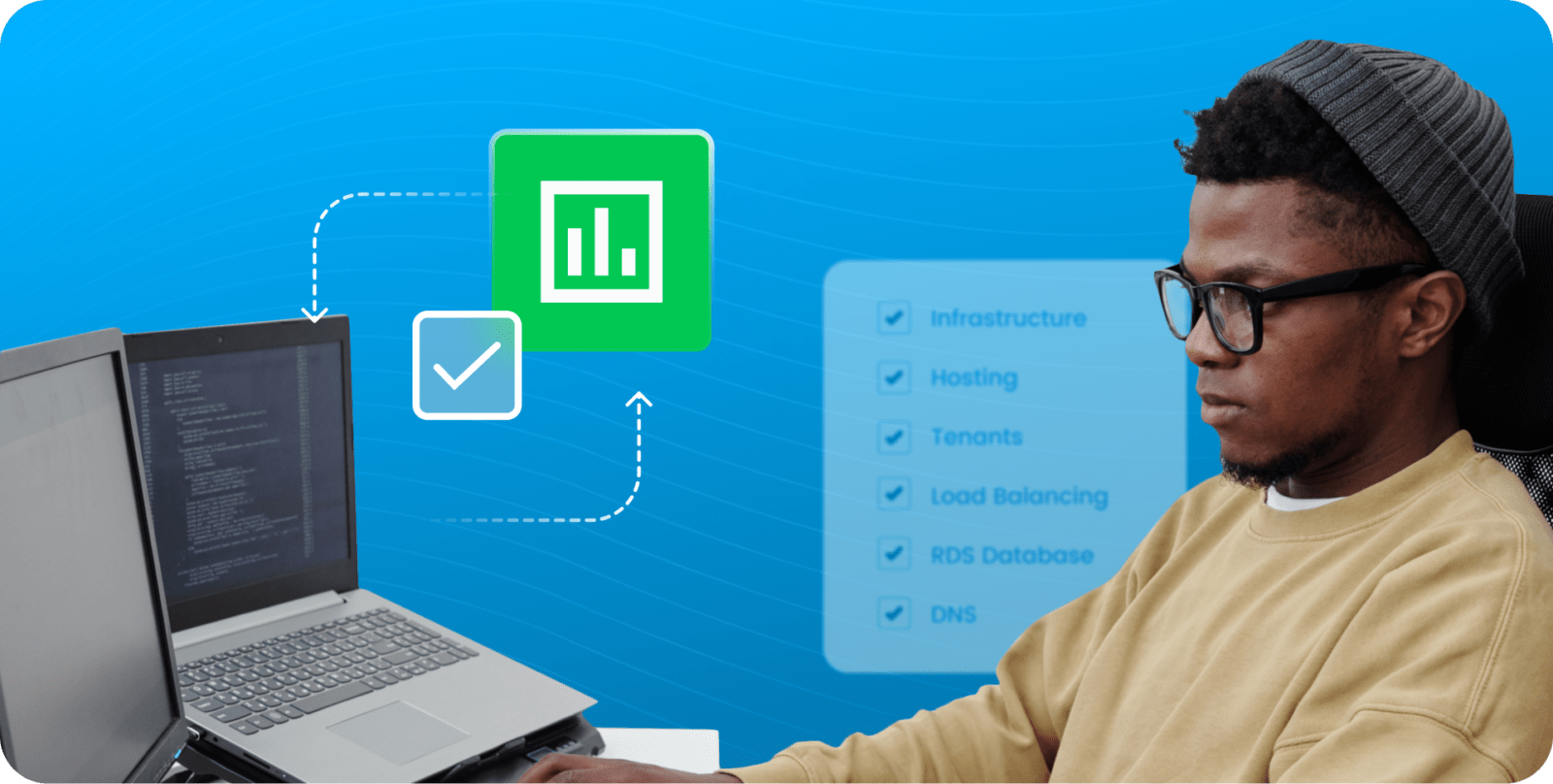What you need to know about implementing DevSecOps solutions on your team
Security threats are becoming commonplace for organizations of all sizes, from school districts to social media giants. It is perhaps not surprising that DevSecOps, an application process that builds security fixes into every stage of the development cycle, is gaining popularity. But what does implementing DevSecOps actually look like in practice? And what does it really mean?
This guide will walk you through the basics of DevSecOps and DevSecOps-as-a-Service, and provide an overview of tools and resources for implementing DevSecOps tools on your team.
Jump to a section…
Which Industries Should Consider DevSecOps
Benefits of DevSecOps-as-a-Service
DevSecOps-as-a-Service and Compliance
DevSecOps Training and Certification Programs
DevOps Institute: DevSecOps Foundation (Beginner)
GIAC: Cloud Security Automation (Intermediate)
EXIN DevSecOps Manager (Advanced)
DevSecOps Engineers and the Job Market
Some Must-Have Skills for DevSecOps Engineers
Defining DevSecOps
DevSecOps is an application development process that integrates three separate disciplines: development, security, and operations. Teams choose to approach product development through the DevSecOps lens because it bakes in security at every stage of the software development cycle without delaying time to market.
Why DevSecOps?
Cloud-native applications have short development cycles. In the past, developers had months, sometimes years to work on a new product. Now that most software is built for the cloud, teams often complete the entirety of their CI/CD pipeline in a matter of weeks. DevSecOps emerged in response to these changes so that developers can push out new products quickly while meeting all compliance requirements.
DevSecOps vs. DevOps
DevSecOps is an augmented, evolved version of DevOps. DevOps focuses on speeding up the development cycle by integrating development and operations processes but does not mandate security procedures. DevSecOps uses the same methodology while building security measures into every step of the development cycle.
Benefits of DevSecOps
Implementing a DevSecOps pipeline helps teams keep security top of mind throughout the development cycle.
- Integrated Security Measures: Testing code and adding fixes before the product is finished allows DevSecOps teams to reduce errors and prevent potential security threats.
- Faster Time to Market: Building in security features throughout the development cycle (instead of waiting until the end) saves weeks in compliance reviews.
- Reduced Costs: Addressing security issues after the product is already built can be costly. Reducing errors ahead of time saves development teams from dealing with expensive breaches down the line.
- More Collaboration: DevSecOps puts experts in different disciplines on the same team. Instead of working in a closed-off environment, DevSecOps teams have to communicate with each other constantly and work toward a common goal.
- Automation: Standard security checks and compliance considerations can be baked into the DevSecOps process, making it easy to replicate in different environments.
Which Industries Should Consider DevSecOps
Every development team, no matter which sector they work in, needs to be concerned about security threats and can therefore benefit from implementing DevSecOps. However, certain industries that deal with personal information or that must follow advanced compliance protocols will find DevSecOps especially useful. That includes:
- Governments: Federal, state, and local government agencies handle sensitive data about private citizens and critical infrastructure. If that data falls into the wrong hands, the consequences are widespread and can be incredibly damaging to millions of people.
- Healthcare: Healthcare providers and administrators are responsible for safeguarding protected health information (PHI) of their patients. Built-in security solutions can help companies stay HIPAA compliant.
- Finance: Companies in the financial sector are frequent targets of cyber attacks. Implementing a DevSecOps process can help development teams prevent security threats before they form.
Learn more about what DevSecOps is and how it works.
DevSecOps-as-a-Service
DevSecOps-as-a-Service is a subscription-based cloud-native product that provides developer teams with a DevSecOps platform. Start-ups and small businesses that want to implement DevSecOps but are not ready to hire a new development team often choose DevSecOps-as-a-Service solutions to speed up their time to market and ensure compliance.
Benefits of DevSecOps-as-a-Service
DevSecOps-as-a-Service comes with all the conveniences of a cloud-based solution:
- Cloud-Native and Flexible: The flexibility of working in the cloud enables collaboration between the different disciplines involved in DevSecOps.
- Scalable: DevSecOps-as-a-Service comes with all the benefits of a subscription service. You can pay for the features you need from an out-of-the-box solution and customize it as your organization grows.
- Always Up to Date: Security updates happen automatically so you’re never out of the loop on the latest compliance changes.
- Accessible to Start-Ups and Small to Mid-Size Businesses: Purchasing a DevSecOps solution is often more affordable than building your own DevSecOps platform. That means businesses that would otherwise be unable to launch and implement a DevSecOps process on their own can use DevSecOps-as-a-Service to streamline their security and compliance processes.
DevSecOps-as-a-Service and Compliance
DevSecOps-as-a-Service integrates automated security protocols into every stage of the development cycle, which intrinsically makes it easier for companies to build compliant products. Automating key security measures also saves time and reduces the likelihood of human error.
Curious about DevSecOps-as-a-Service? We can answer your questions in our article, What Is DevSecOps as a Service?
DevSecOps Tools
Companies can implement DevSecOps using different tools that bake in security at various stages of the development cycle, or they can choose a platform that offers a complete DevSecOps solution. Let’s first take a look at the different categories of DevSecOps tools and then talk about some of the most popular platforms.
Types of DevSecOps Tools
If you’re not building a DevSecOps platform from scratch, you will most likely end up choosing an out-of-the-box solution that combines the capabilities below, or mix and match different tools that accomplish one of these security measures:
- Software Composition Analysis (SCA): SCA tools scan open source applications for security vulnerabilities, compliance issues, and licensing problems. If an issue is discovered, an SCA will also offer remediation guidance.
- Static Application Security Testing (SAST): SAST tools perform the same function as SCA tools, but on proprietary code. Most developers will use both an SCA and a SAST tool to make sure every stage of the development cycle goes through a proper scan.
- Dynamic Application Security Testing (DAST): DAST tools identify vulnerabilities in running applications (unlike SCA and SAST tools which scan code that’s still being developed). A DAST tool will safely introduce SQL and OS injections, scripting errors, or insecure cookies to test the application’s security and compliance functions.
- Testing Automation: Automating QA testing saves companies time. Instead of having to hire an entire QA team, a DevSecOps testing automation tool can run in the background while you focus your precious resources on engineering and integration.
Read more on how DevOps low-code and no-code automation enables developer self-service:

Most Popular DevSecOps Tools
DuploCloud
DuploCloud offers an all-in-one DevSecOps-as-a-Service software platform that builds security into every stage of the development cycle. Continuous compliance monitoring and automated infrastructure provisioning allow developers to cut down on time to market without ever cutting corners on compliance. DuploCloud offers seamless integration with major cloud services as well as popular commercial and open source tools
Aqua Platform
Aqua Platform is a cloud-native application protection platform (CNAPP) from Aqua Security. It offers a number of DevSecOps utilities, including automatic security issue detection, malware identification, and a weakness detection feature. Aqua Platform supports an end-to-end vulnerability management workflow, including detection, remediation, testing, and deployment.
Codacy
Codacy automates live code review and supports over 40 programmatic languages via cloud and self-hosting. Its static code analysis system scans for vulnerabilities early in the development process. Codacity’s platform also lets developers customize rulesets to align quality standards across teams and remove false positives.
SonarQube
Another static code analysis tool, SonarQube can distinguish between Security Hotspots (potential security issues that need to be reviewed) and Security Vulnerabilities (critical issues that need to be reviewed ASAP). This feature can help DevSecOps teams divide and conquer their priorities throughout the development cycle.
ThreatModeler
ThreatModeler provides automated, full-cycle visibility into application workflows. Users can automate testing, threat modeling, and remediation by implementing ThreatModeler's reusable threat templates or creating their own in the customizable threat library.
To learn more about different DevSecOps tools on the market, read 9 DevSecOps Tools for Streamlining Security During Development.
DevSecOps Training and Certification Programs
Though the principles behind DevSecOps are not new, it’s still a relatively young field. As a result, there is no one true way to learn about DevSecOps. Some companies, especially start-ups or small to mid-size businesses, may not want to invest in costly courses and prefer to get an out-of-the-box DevSecOps solution. This usually allows them to move forward with the development cycle without additional training.
However, if you’d like to take some formal courses, here are a few popular options:
DevOps Institute: DevSecOps Foundation (Beginner)
The DevSecOps Foundation certification program is a good option for those who want to learn more about the philosophy behind DevSecOps, but it can also be a great introductory course for anyone interested in working further in the field. The course is available in five languages and certification lasts two years (students can renew their certificate through continuous education). The content focuses on introducing foundational DevSecOps operations and application security.
GIAC: Cloud Security Automation (Intermediate)
The GIAC Cloud Security Automation certificate program is tailored to professionals already working in a DevOps environment or public cloud. The program goes into microservice, container, and cloud security, as well as related topics. Participants need to take a 75-question exam with a passing score of 61% or above to earn the certification.
EXIN DevSecOps Manager (Advanced)
The EXIN DevSecOps Manager certificate is aimed at advanced IT professionals who want to lead DevSecOps teams. You will need to obtain a Foundation-level certificate in Agile Scrum, Lean IT, or DevOps and get a Specialist-level certification in ISO/IEC 27001 or DevOps Professional status before entering this program. Curriculum is focused on ways to make DevSecOps a long-term, sustainable process for your team.
Read 7 DevSecOps Training Programs & Certifications Worth Investing In to learn more.
Hiring a DevSecOps Engineer
DevSecOps engineers are a bit of a unicorn in the tech world because their jobs require expertise in three previously distinct areas (development, security, and operations). If you would like to add a DevSecOps professional to your team, here are some things to consider.
DevSecOps Engineers and the Job Market
Because the job requirements are rigorous and because DevSecOps is becoming more popular, DevSecOps engineers are in high demand. The national average salary for a DevSecOps engineer is around $136,000 a year. Large tech companies with bigger budgets snap up DevSecOps pros quickly, which makes the labor market even more competitive. Small and mid-size businesses often choose a DevSecOps-as-a-Service platform and either work with their current team or find one or two qualified professionals who can implement an out-of-the-box solution.
Some Must-Have Skills for DevSecOps Engineers
DevSecOps engineers need to have a broad set of skills on their resume and the ability to collaborate with people from various IT backgrounds.
Educational Background
- A Technical Degree: Bachelor’s degrees in cybersecurity, computer science, or computer engineering are most common. But former math, engineering, and hard science majors also can find themselves in the DevSecOps field.
- Relevant Industry Certifications: Cisco, CompTIA, DevOps Institute, Practical DevSecOp, EC-Council, and (ISC)²
The IT world offers a lot of continuing education opportunities. If a candidate has a robust set of certifications but no formal degree, they could still make an excellent hire.
Hard Skills
- Command of Core Principles: Automated testing, rapid and incremental software updates, developer-led security improvements, threat preparation practices, and compliance testing.
- Software Development: Fluency in popular programming languages like Python and Java, familiarity with developer tools like GitHub and Docker, and an understanding of methodologies like Agile.
- Cybersecurity Knowledge: Understanding of the latest risk assessment techniques, threat modeling approaches, cybersecurity threats, and best practices.
- Familiarity with a DevOps Toolkit: Chef, Ansible, and Puppet.
Soft Skills
- Strong Communication Skills: Since working cross-functionally with others is a key component of DevSecOps, qualified candidates should demonstrate the desire and the ability to translate what they’re doing to other teams in your organization.
- Collaborative, Team Player Mentality: DevSecOps engineers need to be able to cooperate and coordinate with multiple stakeholders on your development team. Their ability to move between many different disciplines is what makes their job unique.
Looking to hire a DevSecOps team? Check out 8 Skills Every DevSecOps Engineer Should Have.
Want to implement DevSecOps on your own? DuploCloud’s DevSecOps-as-a-Service platform can help speed up your time to market while making sure you’re up to date on all compliance and security protocols.








